 Website:
Condair Group AG
Website:
Condair Group AG
Group: Condair Group
Catalog excerpts

FOOD INDUSTRY The importance of air humidity in production and storage Air humidification, dehumidification and evaporative cooling
Open the catalog to page 1
The necessity of air dehumidification in the food industry When it comes to producing, processing, packaging and storing foods, it is incredibly important for companies to meet strict hygiene standards to ensure permanently high product quality. At the same time, failure-free production processes often require not only good indoor air quality but also constant, narrowly defined room temperatures and humidity levels. However, these are constantly affected by moisture infiltration from warm, humid external air, people and the products themselves. Depending on the type of food and its...
Open the catalog to page 2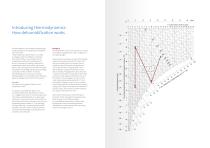
Introducing thermodynamics: How dehumidification works In thermodynamics, the variables of enthalpy (h), temperature (t) and humidity (x) are inseparable from each other. These variables are represented in a so-called h,x diagram. Here the enthalpy h is the total heat content of the air, consisting of the air temperature and the water vapor present in the air. In the case of humidity, a distinction is made between absolute humidity x (g of water vapor in the air per kg of air) and relative humidity. The relative humidity (φ) indicates the percentage of saturation of the air. When it comes...
Open the catalog to page 3
Improvement of production quality and consistency Hygroscopic raw and production materials Spray drying for the production of powdered foods In many areas of the food industry, products are processed into powders in industrial processes. These powders then enter the market as finished goods or are used as basic substances for the production of other goods. Such products include, for example, milk powder, instant coffee and cappuccino powder. Avoid material reactions and preserve raw material quality In order to ensure the best possible industrial processing and damage-free storage of...
Open the catalog to page 4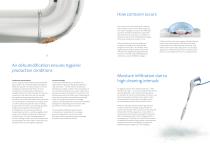
How corrosion occurs Iron cannot rust in sufficiently dry air. However, when moisture settles on the metal, oxygen (O2) and water (H2O) begin to react to form hydroxide ions (OH-). To balance the electrons required for this reaction, the iron oxidizes, i.e. it releases its electrons, which are then absorbed by the oxygen. This process produces iron oxide, i.e. rust. Where the electrons have been withdrawn, an electron shortage occurs and positively charged iron atoms (Fe2+) are released. These migrate into the water droplets and combine there with the negatively charged hydroxide ions...
Open the catalog to page 6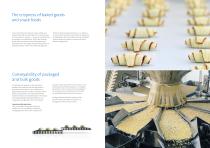
The crispness of baked goods and snack foods Every child knows that biscuits, crisps, pretzels and pretzel sticks that are stored open for a certain period of time lose their crispness — they draw moisture from the ambient air and absorb it. In the case of baked goods, which primarily consist of the hygroscopic ingredients flour and sugar, the desired properties can be guaranteed by means of humidity management. Wherever bread is baked and stored, i.e. in bakeries or, even more extensively, in the industrial production of baked goods, the use of effective dehumidification systems serves to...
Open the catalog to page 7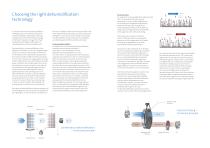
Choosing the right dehumidification technology As shown in the brochure, there are different challenges to be met in the food industry for air dehumidification. Depending on the type of production, further processing and storage of the food, the spectrum ranges from “high temperature with high humidity levels” to “low temperature with low humidity levels”. One possibility for air dehumidification is the operation of ventilation units with integrated water coolers. In this process, the outside air drawn into the ventilation unit is cooled down significantly in the cooler, thus dehumidified...
Open the catalog to page 8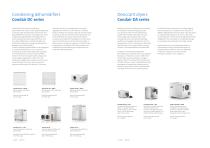
Condensing dehumidifiers Condair DC series Desiccant dryers Condair DA series Condair DC series industrial condensing dehumidifiers are used in a wide range of applications in industry, trade and warehouses. The process of air dehumidification is based on a cooling process. A low temperature is generated by the cooling machine, which condenses the water vapor from the air and thus dehumidifies the air. Such dehumidifiers are particularly suitable for ensuring humidity levels of between around 40� and 60�. Condair condensing dehumidifiers can be configured in a variety of ways and to suit...
Open the catalog to page 9
© 9/2020 Technical modifications and errors excepted
Open the catalog to page 10All Condair Group AG catalogs and technical brochures
-
Condair Group Corporate Brochure
24 Pages
-
Automotive brochure
4 Pages
-
Condair MLP RO
6 Pages
-
Condair RO-A
6 Pages
-
Condair DP
16 Pages
-
Draabe TurboFog
8 Pages
-
Condair HP
2 Pages
-
Condair DL
11 Pages
-
Condair CP3mini
6 Pages
-
Defensor PH15 and PH28
12 Pages
-
Condair ME
5 Pages
-
Condair OptiSorp
4 Pages
-
Condair Esco
8 Pages
-
Condair GS
8 Pages
-
Condair EL
5 Pages
-
Condair RS
5 Pages
-
Condair JetSpray
8 Pages
-
Draabe NanoFog Evolution
8 Pages
-
Condair SE
4 Pages
-
Condair PureFlo
4 Pages
-
e-LINKS
4 Pages
-
Condair Atomisers
4 Pages
Archived catalogs
-
ABS3
4 Pages
-
Defensor Mk5
6 Pages
-
Condair Dual2
6 Pages



































